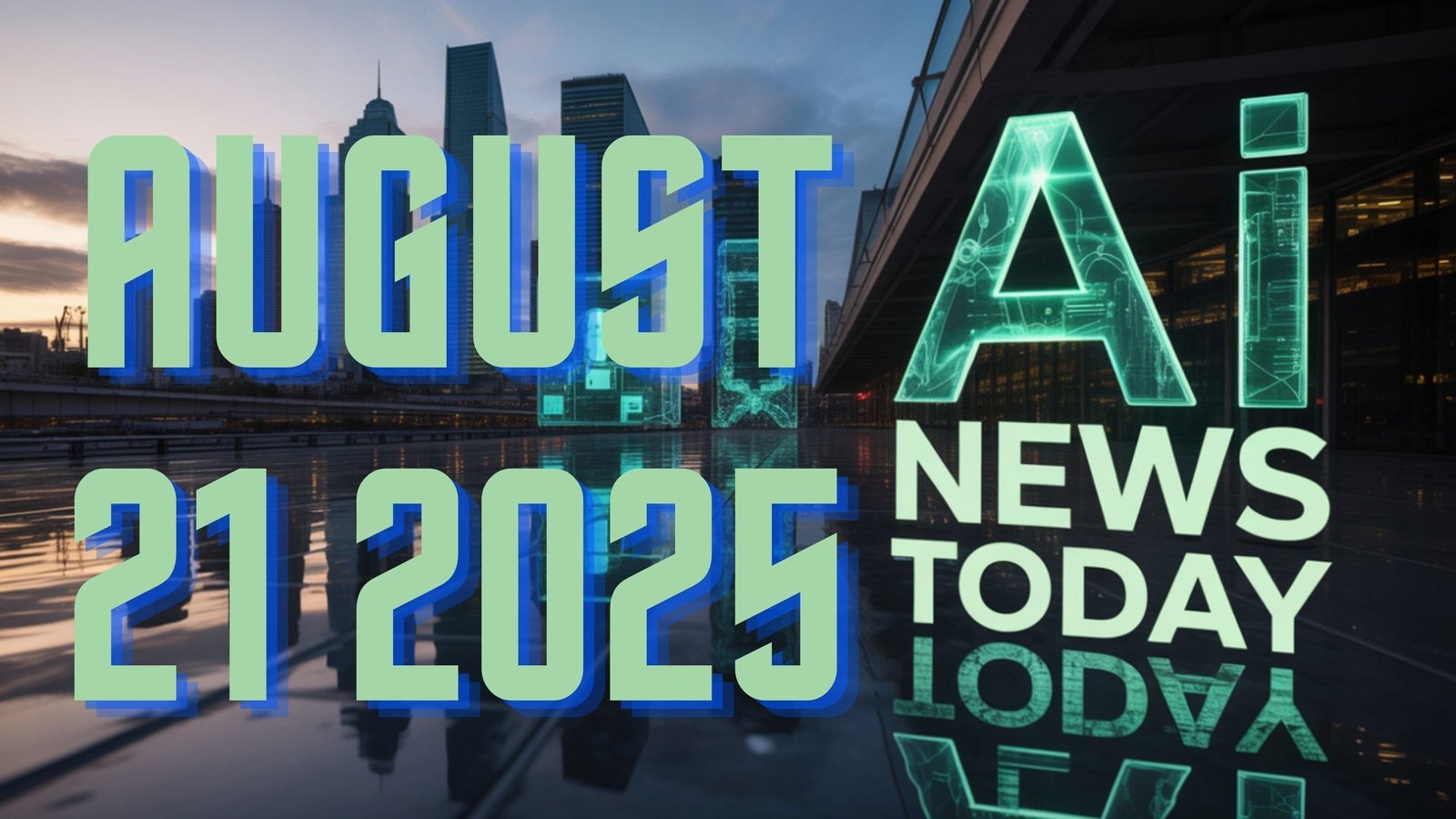Artificial Intelligence continues to reshape industries, politics, and society across the United States. From Silicon Valley strategy shifts to grassroots makerspaces in the Midwest, today’s AI news reveals how innovation, regulation, and ethical concerns collide. Below, we provide a comprehensive overview of the most important AI developments in the USA on August 21, 2025.
Meta Freezes AI Hiring Spree After Strategic Spending Review
Meta, one of the largest global technology firms, has abruptly paused its nationwide AI hiring initiative just months after launching its ambitious “Superintelligence Lab.” The freeze follows billions of dollars spent on top-tier talent acquisition, specialized hardware, and massive cloud infrastructure expansion.
According to internal sources, select research projects will continue, particularly those related to AI safety, foundational model optimization, and generative capabilities. However, expansion plans for additional AI hubs across the U.S. are temporarily suspended.
Industry analysts suggest this reflects a strategic reassessment of Meta’s long-term AI roadmap. The company faces increasing pressure from investors concerned about runaway spending and uncertain monetization strategies.
Meta’s move is significant because it signals a broader cooling period in the AI hiring market, especially after years of aggressive recruitment wars between Meta, Google DeepMind, OpenAI, Anthropic, and other AI-first companies. The freeze may also push highly skilled researchers toward startups and government-backed AI initiatives.
AI Surveillance Allegations Spark Civil Liberties Debate in the U.S.
New reports have emerged alleging that U.S. officials are deploying AI-powered surveillance systems to monitor and track pro-Palestinian protest organizers. Rights groups claim these advanced tools are used to analyze facial recognition data, social media activity, and communication networks to flag activists and identify their networks.
Civil liberties organizations argue that such technology directly threatens privacy and free speech. Concerns are mounting that AI systems could be weaponized to suppress dissent and disproportionately target specific communities.
The government has yet to confirm or deny these claims formally, but if proven true, the deployment would mark one of the most expansive uses of AI in domestic surveillance in recent U.S. history.
Legal experts warn of potential constitutional challenges, particularly around the First and Fourth Amendments. Advocacy groups call for transparency, oversight, and legislation to prevent the unchecked use of AI in protest monitoring.
Nebraska Launches AI Makerspace to Boost Regional Innovation
Nebraska has become a new hub for AI prototyping and education in a groundbreaking move. A partnership between Scott Data and Nebraska Engineering has resulted in the launch of a collaborative AI Makerspace, designed to empower students, startups, and entrepreneurs.
The facility will provide access to AI hardware, cloud computing resources, mentorship, and workshops. Its primary goal is to ensure that AI innovation is not confined to coastal tech giants but spreads across the Midwest and beyond.
By emphasizing accessible AI education and applied prototyping, the makerspace will be an incubator for early-stage companies working in agriculture, manufacturing, logistics, and healthcare—industries where AI adoption has been slower.
Nebraska’s initiative represents a broader trend of democratizing AI innovation, enabling smaller communities to participate in shaping the next wave of technological transformation.
Dell Expands AI Innovation Ecosystem in North America
Dell Technologies has announced the opening a new AI Innovation Hub in North America, with a strong focus on supporting businesses across the Midwest and Southern United States.
The hub will provide companies with:
- AI infrastructure and high-performance computing resources
- Specialized training programs for employees
- Industry partnerships for practical AI adoption
Early partners include manufacturing firms, logistics companies, and healthcare providers—industries where AI promises to deliver immediate efficiency gains and cost reductions.
Dell’s strategy reflects a shift away from AI as a purely research-driven endeavor and toward applied AI solutions that create measurable impact for businesses. With cloud competition intensifying, Dell is positioning itself as a bridge between AI research and enterprise applications.
Why Meta’s Hiring Freeze Could Reshape U.S. AI Competition
Meta’s decision to pause its hiring spree may have broader implications for the U.S. AI landscape. Competitors like Microsoft, Google, and Amazon may seize the opportunity to attract top-tier researchers. Smaller startups could also benefit from an influx of highly skilled talent that is suddenly available.
The freeze also underscores a growing concern: the sustainability of AI investment. While tech companies poured billions into large language models, robotics, and multimodal AI, monetization remains uncertain. Industry insiders suggest this may signal the start of a more cautious and results-driven phase of AI growth.
AI Ethics and Privacy Take Center Stage in National Debate
The allegations of AI surveillance in protest monitoring have reignited the national debate around AI ethics. On one side, government and law enforcement agencies argue that AI enhances public safety. On the other hand, activists warn that unchecked surveillance risks creating a “digital authoritarian state.”
Key issues at stake include:
- Bias in AI recognition systems could disproportionately impact minority groups.
- Data privacy concerns are especially relevant when AI integrates social media and facial recognition.
- Legal accountability in cases where AI-driven systems make wrongful identifications.
The debate highlights the urgent need for federal AI governance frameworks that balance innovation with protecting civil liberties.
Regional AI Hubs: A Shift Beyond Silicon Valley
The Nebraska makerspace and Dell’s AI hub highlight a broader trend: AI innovation is no longer concentrated exclusively in Silicon Valley or major coastal cities. Instead, states in the Midwest and South are emerging as new centers for AI development.
This decentralization could have significant benefits:
- Broader talent distribution, reducing reliance on expensive urban hubs.
- Industry-specific innovation, especially in agriculture, manufacturing, and healthcare.
- Economic development in smaller communities through AI-driven startups.
By focusing on practical applications of AI, regional hubs are making the technology more inclusive and accessible.
Wrap Up: U.S. AI Landscape Balances Growth, Ethics, and Strategy
The AI developments on August 21, 2025, reveal a complex picture of progress and tension. Meta’s hiring freeze signals financial caution, while Nebraska’s makerspace and Dell’s innovation hub emphasize regional growth and accessibility. Meanwhile, the AI surveillance controversy underscores the country’s urgent ethical challenges.
As AI continues transforming industries and governance, the U.S. stands at a critical crossroads: balancing rapid innovation with responsible oversight. The decisions made now will shape not just the future of technology, but also the values and freedoms of American society.

Selva Ganesh is a Computer Science Engineer, Android Developer, and Tech Enthusiast. As the Chief Editor of this blog, he brings over 10 years of experience in Android development and professional blogging. He has completed multiple courses under the Google News Initiative, enhancing his expertise in digital journalism and content accuracy. Selva also manages Android Infotech, a globally recognized platform known for its practical, solution-focused articles that help users resolve Android-related issues.




Leave a Reply